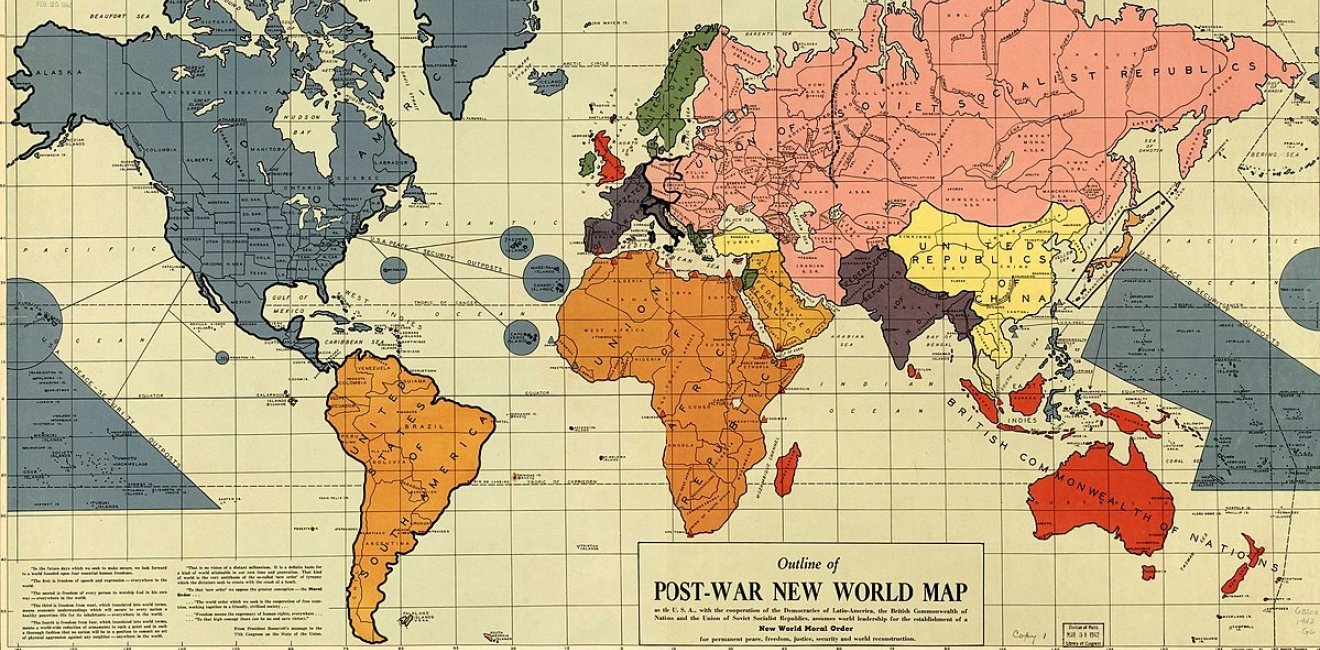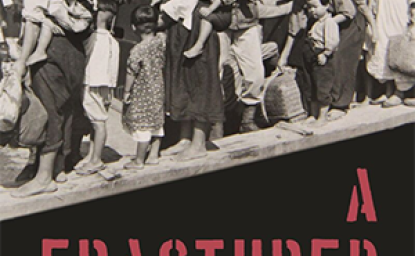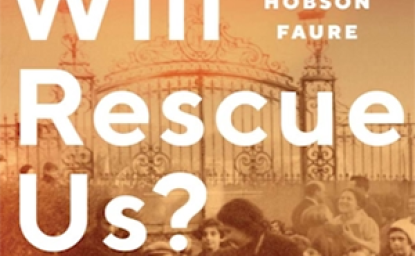Q: Describe your background and what brought you to the Wilson Center.
During my youth in Upstate New York, yearly visits to my father’s home country of Poland spurred my interest in the development of collective identities between the Baltic and Black Seas. I was especially captivated by my grandfather’s account of our family’s forced postwar resettlement from present-day Belarus to the western “recovered territories” of Poland annexed from Germany, which played a key role in motivating me to leave high school early and pursue a more formal, interdisciplinary education in the history of borderlands at Bard College at Simon’s Rock. A decade later, in 2021, I completed my doctorate in History at Harvard University, where I wrote a dissertation on the formation of ideas of international order across the Eurasian networks of intellectuals, revolutionaries, soldiers, and exiles from the borderlands of the late Russian Empire, the early Soviet Union, and interwar Poland. Right before coming to the Wilson Center, I taught for a semester at Columbia University, piloting one course on self-determination in the twentieth-century world and another on cities and modernity in Eurasian empires on the eve of World War I. Working with the talented and passionate students at Columbia was definitely the most intellectually and personally formative experience that I’ve had since I began graduate school, so I know that I want to continue teaching in some capacity in the future. After finishing up in New York City, I came to the Wilson Center in search of an intellectually diverse, interdisciplinary, and internationally minded community in which to complete a major part of the research and writing for my ongoing book project, which combines elements of my dissertation with an examination of the writings of Ukrainian-, Polish-, and Russian-speaking emigres concentrated at the Library of Congress.

Q: What project are you working on at the Center?
In the broadest sense, my project is a history of federalist thought and politics in the nineteenth and twentieth centuries, with a focus on the imperial Russian and Soviet borderlands as sites of intellectual exchange and cross-cultural entanglement that sustained global networks of knowledge production. Chronologically and conceptually, my narrative tries to reconstruct the imperial roots and international afterlives of the ambitious, yet ultimately unsuccessful and largely overlooked, attempts of non-Bolshevik socialists to transform the embattled territory of the former Russian Empire into a voluntary federation of nations and regions in 1917 and early 1918. In the United States, it has been common since the beginning of the Cold War for historians and social scientists to argue for a sharp divide between the federal systems of the Anglophone and German-speaking worlds, on one hand, and the much more centralized model devised by the Bolsheviks in 1918 and partly inherited by the Russian Federation under Yeltsin and later Putin. While I don’t intend to fundamentally contest this claim, I seek to illustrate that the Bolsheviks’ revolutionary competitors genuinely strove to adapt federal structures from Central Europe, North America, and the British settler dominions to Russia’s dizzying mosaic of nationalities, believing, in turn, that a federalized Russia would become a cutting-edge laboratory for future pan-European and global federations as other empires grew economically exhausted from three years of world war.
The important point, I think, is that multiple strains of federalism that had taken shape in different parts of the Russian Empire and elsewhere in the world since the 1830s now converged and competed within a highly charged and high-stakes environment of generalized social and political breakdown, while these same tendencies continued to mutate and interact in emigration during the interwar years and well into the Cold War. Influenced by methods from global and imperial history, I focus less on individual national contexts and more on networks of people, organizations, and ideas that flowed across linguistic, cultural, and ideological borders, which allows me to trace a tangle of trajectories spanning the decades between the 1880s and the 1990s, with Russians, Belarusians, Ukrainians, Poles, Georgians, Azeris, Tatars, Jews, and many others among my principal characters. To keep the project focused, however, I’ve chosen to concentrate on a few major episodes of imperial crisis and collapse, such as that of 1917 to 1922, that proved particularly fertile for federal experiments in which hitherto theoretical ideas found expressions in concrete policies, however abortive they may have turned out to be in the end.
Q: How did you become interested in your current research topic?
Much of the archival work that I conducted for my dissertation dealt with the Promethean movement, an interwar network of Polish military intelligence agents and ethnically sundry exiles from the borderlands of the former Russian Empire who sought to topple the Bolsheviks and replace the Soviet Union with an alliance of sovereign nation-states. While it’s certainly accurate to interpret Prometheism as an outgrowth of a longer lineage of Polish designs to shatter the Russian Empire along national lines in the long nineteenth century, I eventually started to grasp that it was ultimately the failure of liberal and socialist bids to decentralize Russia in 1917 that turned many proponents of autonomy and federation into Promethean separatists as they fled the bayonets of the Bolsheviks and the Whites over the next few years, finding some of their most eager patrons in Warsaw. Working from home during the pandemic with just months to go before I had to defend my dissertation, I tried to gather all of the digitally accessible materials on the failed yet fascinating federal projects of 1917 that I could find, incorporating some of them into an introduction that served as one of the points of departure for my present research at the Wilson Center.
I definitely found these federal imaginations so intriguing because I had earlier been fortunate to become acquainted with a sweeping survey of recent work on the comparative history of empires in my first year at Harvard, which broadened my longstanding fascination with Polish-Ukrainian-Belarusian borderlands to encompass all of imperial Russia, not only as a sprawling multiethnic polity in its own right but equally as part of a wider global ecology of interconnected empires. After reading groundbreaking studies on the creation of the Soviet system of ethnic federalism under Lenin and Stalin for my second-year general examinations, I wanted to know more about how people from the Eurasian borderlands responded to the outward spread of Bolshevik power from central European Russia after early 1918 and where in the world they turned for inspiration for alternate, post-imperial forms of internationalism and international order. One of my main findings, confirmed by the Promethean case, was that the turmoil and displacement of the civil war years crucially reconfigured the currents of internationalist thought that had been developing in the borderlands up through 1917, both by geographically transforming where these ideas were being physically debated, printed, and circulated and by generating the ideological and material bases for a loose, partly Polish-funded alliance against the newly ascendant Bolsheviks. While interwar Prometheism will figure prominently into my book manuscript, I’m devoting my time in Washington to getting a gritty and intimate feel for the ideas of a cohort of predominantly Ukrainian- and Russian-speaking thinkers who preferred Russia’s federalization to its fragmentation well before, and sometimes long after, the making of the Soviet system.
Q: Why do you believe that your research matters to a wider audience?
My hope is that this project will resonate with an audience broadly interested in the tracing the history of globalization in the modern world. While my main focus is on the Russian and Soviet borderlands, the thinkers at the center of my research were deeply concerned with reordering the uneven international divisions of political power and socioeconomic development whose legacies continue to shape our world in the twenty-first century. Federalism, in their imaginations, was first and foremost a strategy for replacing hierarchical forms of imperial rule with a more lateral, decentralized “family of nations,” as some of them put it, not only across the contiguous empires of northern Eurasia but also throughout the maritime colonial empires of Western European metropoles. Crucially, these federalists were profoundly preoccupied with reorganizing the world economy by replacing raw colonial exploitation with a cooperative, mutually beneficial balance of trade and labor between dominant industrialized regions and their more agrarian peripheries. While empires largely ceded the Eastern Hemisphere to a mosaic of smaller nation-states during the twentieth century, the problems of global material inequality with which my federalists grappled are still alive and urgent today, particularly as the pressures of migration and climate change demand robust, transnational frameworks for sustainable development on a worldwide scale.
Federal projects on regional, continental, and global levels, to this end, offer a layered, hybrid strategy for reconciling more localized forms of national sovereignty with the coordination of resources and political decision-making along transnational lines, which is precisely what the characters in my narrative were trying to accomplish slightly more than a century ago. At least before Russia descended into civil war, few of them saw many benefits in independent nation-statehood, considering it more advantageous to rework and redeem imperial amalgamations of territory, population, and resources in the form of post-imperial federations. Their outlook, in a word, centered on federalism as the concrete embodiment of internationalist ideas of a common humanity rooted in justice and mutuality, challenging the imperial and colonial systems of world domination in their own time and, for future generations, offering provocative conceptual material with which to critically think about the extreme post-imperial inequalities that pervade our present landscape of globalization.
On this same subject of empires and their enduring afterlives, I think that my project will be of interest to anyone who has been trying to contextualize Putin’s invasion of Ukraine while imagining what kinds of European, Eurasian, and world order might emerge from this war and its wider repercussions. Many of the federalist thinkers whose ideas I examine came from the Ukrainian-speaking parts of the late Russian Empire, and they wrote prolifically about how to transform what they saw as the historically exploitative, colonial relationship between the industrial centers of “Great Russia,” namely Moscow and Saint Petersburg/Petrograd, and the ethnically non-Russian borderlands coveted for their raw materials and geostrategic benefits. At the same time, particularly amid the revolutionary upheavals of 1917, these Ukrainians insisted that turning Russia into a federation wasn’t enough, meaning that Ukraine’s freedom and security lay in the realization of a federal system of economic and political cooperation encompassing the whole of the European continent, if not even more of the globe.
I think that the intellectual inheritance of Ukrainian federalist thought is relevant to contemporary debates about Ukraine’s place within blocs such as the European Union (EU) and NATO, much in the sense that nineteenth- and early twentieth-century Polish federalist ideas proved to be of immense interest to scholars, policymakers, and wider audiences as they attempted to historically contextualize the eastward EU enlargement of 2004. Yet compared with their situation two decades ago, the affluent liberal democracies of Europe are today beset with an even deeper and more complex state of social and demographic turmoil stemming, in part, from troubled relations with the underdeveloped countries of the Global South. This leads me to sense that Ukrainian federalist visions of a world structured around the principles of political and productive self-determination still have a great deal to offer us a century later as we think about how to confront and overcome imperial legacies, both in the former Soviet space and elsewhere in the world. In other words, for all that we hear about Ukraine being in a position to adopt models of economic development and political reform from the West, I believe, as an intellectual historian, that the West and the world more generally also stand to learn something from the more progressive trends in modern Ukrainian social and political thought.
Q: What is the most challenging aspect of your research?
Perhaps the most challenging yet rewarding aspect of my research is reconstructing what various federalist thinkers were reading at the time that they penned important texts or delivered significant speeches in the midst of wars and revolutionary upheavals. Unlike the heftier academic studies of federalism that some of these characters produced in times of greater stability, these more urgent and impassioned elaborations of projects for the decentralization of the Russian Empire seldom contain formal footnotes or bibliographies, which leaves me to solve the puzzle of what unacknowledged intellectual influences are at play beneath the surface of the materials that I’m working with. In one exceptional instance recorded in a stenographic account of a congress held in Petrograd in the spring of 1917, a member of the Russian Party of Socialist Revolutionaries who framed some of his grouping’s major resolutions on federalism actually held up a pamphlet originally authored by an older scholar of law and government in the aftermath of the Revolution of 1905, explicitly citing this predecessor’s federal proposal as an important inspiration for his own ideas. More often, though, the federalists that I encounter will broadly gesture to the existing legislative and legal models prevailing in Germany, Switzerland, the United States, or one of the British settler dominions, which raises the critical question of how these people from the Russian Empire actually learned about these other countries, whether through physical travel, informal secondhand accounts, or detailed research of their own. Since the Russian and Ukrainian archives potentially containing the personal notebooks of these thinkers are, for the time being, mostly inaccessible, I’ve had to look more closely at their memoirs at the Library of Congress to get a better feeling for the texture of their lives and border-crossing adventures. At the end of the day, I’m trying to chart the material currents by which federalist ideas circulated in the nineteenth and twentieth centuries, so making these connections lies right at the heart of my project.
Q: What do you hope the impact of your research will be?
By recovering how people and ideas flowed between the imperial Russian and Soviet spaces, on one hand, and other parts of the modern world, I want to encourage readers on either side of the former “iron curtain” and the ongoing war in Ukraine to think about political culture and history in ways that complicate the familiar narratives of a struggle of “East” against “West” that we’ve inherited from the Cold War. This is not at all, of course, to downplay the gravity of Putin’s ongoing aggression or the salient legacies of Soviet domination over Central and Eastern Europe, not to mention the former imperial Russian borderlands still directly governed from Moscow. However, I’ve found that closely examining the visions of politically persecuted and internationally exiled federalist thinkers who historically struggled against Tsarist rule, White monarchists, the Bolsheviks, and, today, Putin’s order yields a fascinating range of alternative projects for Russo-European integration that should, at the very least, find a place in our long-term strategic repertoires when the next opportunity to reorganize northern Eurasia arises.
I find it significant that most of the thinkers whose work I’ve been reading took it for granted, around 1905 or 1917, that federal structures from more industrially advanced, and also relatively more democratic, societies could be imported to the Russian Empire and reworked to meet the needs of such a sprawling and pluralistic polity as it moved, in their minds, towards political restructuring and socioeconomic development. As historians like Maria Todorova have pointed out, the notion that an unbridgeable developmental and civilizational rift separated a backward, hostile Russia from a vibrant, progressive Euro-American world was hardly the only or dominant perspective at the turn of the nineteenth and twentieth centuries, with arguments for a broad comparability and even continuity between these regions of the world abounding in the writings of socialist intellectuals. At the same time, it was some of these initial advocates of imperial Russia’s decentralization who found themselves violently expelled from their homelands by the Bolsheviks and the Whites during the civil war years, going on to form one of the earliest and most important cohorts of experts on Russian history and Soviet geopolitics in places from Berlin and Warsaw to Tokyo and Washington between the 1920s and 1960s. As early contributors to budding, state-funded fields of Sovietology in interwar Europe and the Anglophone world during the Cold War, these uprooted men and women sometimes distinguished themselves as emphatic proponents of the view that a malignant Sonderweg, or “special path,” of autocracy and illiberal collectivism linked the times of Ivan the Terrible with the rule of Lenin and Stalin.
In this sense, I am trying to recover a genre of nuanced federal blueprints for Russo-European integration while explaining how the frustration of those ambitious and strikingly inclusive designs by 1922 ended up fueling the subsequent elaboration of alluringly linear, essentializing narratives of Russian backwardness and treachery that are finding widespread traction today. So, while I’m cautious about overestimating the viability of implementing specific, century-old federal models in the near future, I nevertheless remain firm in my belief that taking these projects seriously and engaging with them on their own terms is essential to broadening our sense of the boundaries of what has historically been conceivable, and what may still be possible, in relations between societies that are presently locked in confrontation. One seasoned Polish observer reporting on the impending Bolshevik triumph in 1921, for instance, remarked that the storied republican traditions of Novgorod and Pskov might someday challenge what he described as the much more centralized mode of Muscovite sovereignty embodied in Soviet rule, perhaps creating a Russia more inclined to pursue better ties with the newly independent peoples between the Baltic and Black Seas. While that hope never ultimately came to fruition and certainly feels remote these days, imperial crises and collapses like those of 1917 to 1922 or 1989 to 1991 (and, arguably, into the present) have a way of presenting unforeseen opportunities for even distant ideas to enter the fray and find their footing.
The opinions expressed in this article are those solely of the author and do not reflect the views of the Kennan Institute.
Author


Kennan Institute
The Kennan Institute is the premier US center for advanced research on Eurasia and the oldest and largest regional program at the Woodrow Wilson International Center for Scholars. The Kennan Institute is committed to improving American understanding of Russia, Ukraine, Central Asia, the South Caucasus, and the surrounding region through research and exchange. Read more





